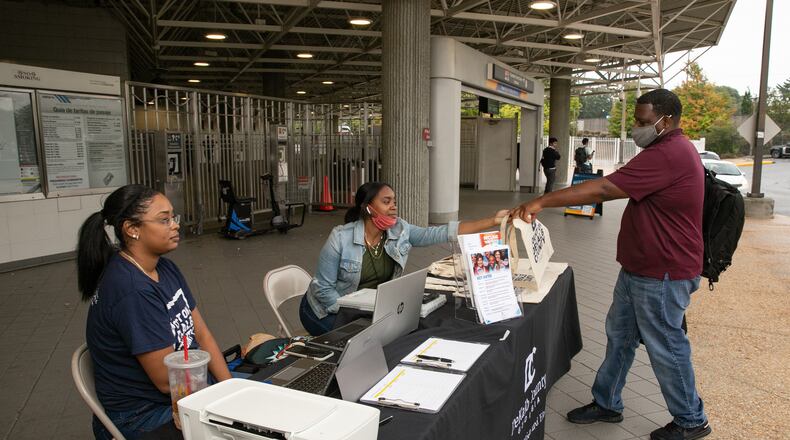Every Georgia voter was already required to have some kind of ID to vote.
Whether they have the right kind of ID to most easily vote by mail under the state’s new voting law is another matter.
About 272,000 registered voters lack a driver’s license or state ID number on file with election officials, meaning they’d have to provide a copy of other identifying documents when requesting an absentee ballot for this fall’s local elections.
Even voter ID cards issued by county election offices are inadequate unless voters take a photo or make a copy of it, then submit it with their absentee ballot applications.
The new absentee ID requirements under Georgia’s voting law are being tested as thousands of voters have requested mail-in ballots ahead of municipal elections, including the closely watched race for Atlanta mayor. In prior elections, officials verified voters by comparing signatures with those on file.
“I think everybody should show ID, but it’s hard for some people,” said Juanita Collier, a Walmart employee who has a driver’s license, at a DeKalb County voter information stand outside the Chamblee MARTA station this week. “People should be able to vote as long as they show something for ID.”
The ID requirements are simple for the 97% of registered voters with driver’s licenses or state ID cards obtained from the Department of Driver Services. Those voters can prove their identities by filling in their nine-digit ID numbers when requesting and returning absentee ballots.
Voters who have some other kind of identification, such as a U.S. Passport or military ID, would have to make a photocopy.
All voters have been required to show photo ID for in-person voting in Georgia since 2008. Most people register to vote when they get their driver’s licenses, the state’s primary form of voter ID. Anyone who registers to vote through the mail must present ID before being allowed to vote for the first time.
Georgia’s government is planning a $250,000 ad campaign to promote free ID cards from the Department of Driver Services that can be used for absentee voting.
The Democratic Party of Georgia is encouraging voters to obtain IDs issued at driver’s license offices so that voters have no issues no matter how they vote, whether by mail or in person.
“Promoting ways to obtain a voter ID card does not change the fact that Republicans have made voting by mail more difficult,” said Saira Draper of the Democratic Party. “Obtaining a photocopy can be challenging for many Georgians, and this additional step will mean disenfranchisement for many voters with mobility issues, transportation issues, in poverty or who are sheltering in place.”
The new ID requirements have led to some absentee ballot application rejections.
The most common reasons for application rejections so far are missing voter identification or failure to use Georgia’s new absentee request form that requires ID, according to state absentee ballot data through Wednesday.
“People will have to get used to what’s required. So we might see some confusion at the beginning,” said Cobb County Elections Director Janine Eveler. “We’re communicating with voters who do have missing information” to allow them to correct their applications.
Over 1.3 million of Georgia’s 5 million voters in last November’s elections cast absentee ballots, a record number as voters avoided in-person polling places during the coronavirus pandemic. Typically, about 5% of voters in previous elections returned absentee ballots.
Credit: Jenni Girtman
Credit: Jenni Girtman
In the presidential race, about two-thirds of absentee voters supported Democrat Joe Biden after Republican President Donald Trump criticized remote voting, despite the fact that he used it.
An audit by the GBI and election investigators found no cases of fraud among 15,000 ballot envelope signatures reviewed in Cobb County last December.
The majority Republican Georgia General Assembly earlier this year required more ID as part of the state’s new voting law, which also shortened absentee application deadlines, reduced the number of ballot drop boxes and allowed state officials to take over county election boards.
“I don’t see a need for that. I feel like it’s harder for people to exercise their natural right to vote because of all those changes,” said Jeremiah Gilyard, a DeKalb voter who stopped by the voter information table at the Chamblee MARTA station this week.
How absentee ID works in Georgia
Requesting a ballot: Voters will sign their name and write their date of birth, address, and driver’s license number or state ID number on their absentee ballot application form. Voters who don’t have a driver’s license or ID card can return a copy of a passport, military ID, voter ID card, utility bill, bank statement, government-issued check or other government document with their application.
Returning a ballot: Voters will sign their name and write their date of birth and driver’s license number or state ID number on their absentee ballot envelope. Voters who lack an ID number can provide the last four digits of their Social Security number instead. Otherwise, voters can enclose a current utility bill, bank statement, government-issued check or other government documentation. All identifying information would be hidden from view when absentee ballot envelopes are sealed.
About the Author
Keep Reading
The Latest
Featured






